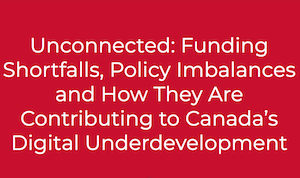 By Amanda Clarke.
By Amanda Clarke.
A recent study, “Unconnected,” commissioned by the Canadian Internet Registration Authority (CIRA) sheds light on crucial gaps in the funding and policy influence of nonprofits, charities and researchers focused on promoting safe, fair and high-quality digital infrastructure and services in Canada.
On funding gaps, it’s a typical tale. Grants are few and far between and competition is tight. Funding application processes are complex and onerous, a problem for organizations that are slim on resources to begin with. Funding that does come through is largely ad hoc and project based.
Why does this funding gap exist? In part, it reflects the fact that Canadian funders are simply less active on this file. We don’t have a strong tradition of digital philanthropy. In contrast, in the US, digital access, inclusion and justice is a much more established area of focus for thinktanks, foundations and philanthropic organizations.
As a corollary to this funding gap, the relatively small group of organizations in Canada focused on digital access, digital rights and digital infrastructure simply can’t compete with the well-resourced lobbying machines of industry – especially the big telecom firms – when it comes to policy advocacy. This last point is particularly concerning at a time when governments are daily faced with a barrage of digital policy issues that present complex and often technical questions on which they often must turn to outside expertise. This includes how to limit the scope of surveillance technologies, how to classify firms in the sharing economy (e.g., Uber), and how to regulate social networks, to name just a few of the policy issues coming at governments at full speed as the digital economy expands its scope.

“Resources are scarce both in terms of absolute dollars available for non-profits, charities and researchers, and in the breadth and depth of granting sources.”
While the report’s findings will obviously be of interest (and likely not a surprise) to anyone focused on promoting digital rights, internet infrastructure and responsible data governance, it should also capture the attention of anyone concerned more broadly about equity, justice and economic prosperity in Canada.
At a basic level, as more and more facets of human society shift to the online realm – not simply because of the pandemic, but also because of a digitizing impulse that both pre-dates and will outlive COVID-19 – we need to be worried about excluding those segments of the population that can’t safely or easily access digital technologies. Government services, employment applications, health information, political participation – these are now being rolled out in a ‘digital by default’ template and without interventions, many already vulnerable groups will be left on the sidelines, especially those of low-income and those living in rural, remote and Indigenous communities.
The federal government has made recent commitments to ensure universal access to broadband, which will do some of the work needed to equalize access, but there remain significant shortfalls in education around navigating online misinformation, protecting personal data from misuse, and understanding automated decision-making and artificial intelligence. These are precisely the areas where well-funded, well-resourced, digital civil society groups could address gaps in public education, and more fundamentally, where a strong digital philanthropic sector needs to be ready to go head-to-head with industry when it comes time to shape emerging policy and regulation.
Amanda Clarke is an Assistant Professor in the School of Public Policy and Administration at Carleton University. She’s on Twitter.
Tuesday, March 9, 2021 in Data Discoveries, For homepage, General
Share: Twitter, Facebook



